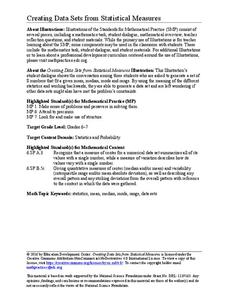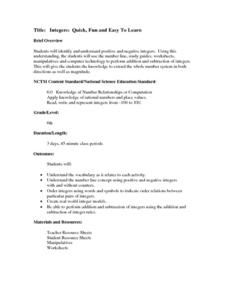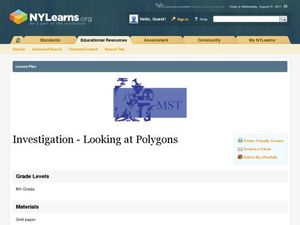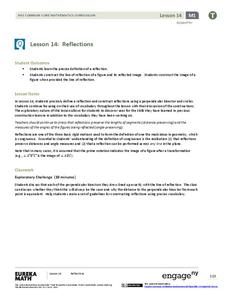Curated OER
Children's Literature Across the Curriculum Ideas-Hanukkah Lights, Hanukkah Nights
Pupils read Hanukkah Lights, Hanukkah Nights by Leslie Himmelman. They complete a variety of cross-curricular activities surrounding the study of Hanukkah. Included are reading, art, math, science, writing, social studies, and library...
Curated OER
Children's Literature Across the Curriculum Ideas-How Dogs Really Work!
Students read How Dogs Really Work! by Alan Snow. They complete a variety of cross-curricular activities surrounding the study of dogs as pets. Included are reading, art, math, science, writing, social studies, and library connections.
Curated OER
Children's Literature Across the Curriculum Ideas-Miss Spider's New Car
Learners read Miss Spider's New Car by David Kirk. They complete a variety of cross-curricular activities surrounding the study of spiders. Included are reading, art, math, science, writing, social studies, and library connections.
Curated OER
Problem Solving Model
Use a vocabulary chart to introduce math functions. The class defines a list of mathematical vocabulary terms on a worksheet, as well as completes equations and expressions. They examine word problems and practice transcribing them into...
Education Development Center
Creating Data Sets from Statistical Measures
Explore the measures of central tendency through a challenging task. Given values for the mean, median, mode, and range, collaborative groups create a set of data that would produce those values. They then critique other answers and...
EngageNY
Extending the Domain of Sine and Cosine to All Real Numbers
Round and round we go! Pupils use reference angles to evaluate common sine and cosine values of angles greater than 360 degrees. Once they have mastered the reference angle, learners repeat the process with negative angles.
National Security Agency
Integers: Quick, Fun and Easy To Learn
A good complement to any integers unit contains a three-day lesson plan about positive and negative integers, adding and subtracting integers, and how to find the additive inverse. Additionally, it provides all necessary worksheets and...
EngageNY
Calculating Conditional Probabilities and Evaluating Independence Using Two-Way Tables (part 2)
Without data, all you are is another person with an opinion. Show learners the power of statistics and probability in making conclusions and predictions. Using two-way frequency tables, learners determine independence by analyzing...
Curated OER
Comparing and Ordering Fractions, Mixed Numbers, and Decimals
Create your own fraction kits by folding and labeling paper using fraction vocabulary. Learners then work in groups to use these in comparing and sequencing both whole numbers and fractions. They also create unit cubes and develop an...
University of Kansas
Newspaper in the Classroom
Newspapers aren't only for reading—they're for learning skills, too! A journalism unit provides three lessons each for primary, intermediate, and secondary grades. Lessons include objectives, materials, vocabulary, and procedure, and...
Curated OER
Simple Inequalities
Students solve inequalities. For this inequalities lesson, students evaluate simple inequalities. They examine vocabulary words. Students participate in breath holding activities and write inequalities to represent the activity. In...
Curated OER
How Many Letters Are In Your Name?
Students discover how to make a graph that represents the number of letters in their names. In this early childhood math lesson plan, students collect data, categorize data, and develop skills to analyze the pieces of data.
NY Learns
Investigation - Looking at Polygons
Middle schoolers construct polygons by plotting points on a coordinate plane. Pupils connect the points and identify which polygons they have drawn. They will need graph paper to carry out the assigned activities. A vocabulary list,...
John Lentine
Butterflies and Bugs
Symmetry, line, shape, art, and math are all connected through a fun hands-on craft. Included are instructions to a classic activity, where learners create butterflies to show symmetry in nature and then discuss symmetry in math. It is...
EngageNY
Reflections
Facilitate creativity in your math class as individuals learn the definition of a geometric reflection and correctly construct a model, as well as its reflected image. They use a perpendicular bisector and circles to elaborate on...
Beacon Learning Center
Cartesian Classroom
Elementary schoolers become points on a Cartesian Plane in their classroom. They review ordered pairs, positive and negative coordinates, quadrants, and the x and y axes. Pupils follow commands that help review vocabulary, such as...
EngageNY
Why Call It Tangent?
Discover the relationship between tangent lines and the tangent function. Class members develop the idea of the tangent function using the unit circle. They create tables of values and explore the domain, range, and end behavior of the...
Curated OER
Number Operations
Inject fun into your math review! Pupils review basic math operations with decimals as well as addition and subtraction with simple fractions. In this number operations lesson, students work in groups to create a game for the math skill...
Math Solutions
Factor Game
Learning about factors and multiples is all fun and games with this simple math activity. The lesson begins with the teacher and class playing the Factor Game together as students figure out the rules and uncover key vocabulary as they...
Intel
Play Ball!
Math and sports meet on the baseball diamond in the first STEM lesson in a series of six that asks pupils to collect and perform comparative analyses of data specific to baseball. Following the analysis, scholars create a presentation...
Curated OER
Making Simple Conversions
Young scholars explore the concept of measurement as it relates to equivalencies. They complete simple conversions using visual models of measurement units, and record their answers in a two-column table.
Curated OER
Incredible Integers!
There are three parts to this lesson on integers. In the first, learners explore positive and negative numbers on an actual painter's tape number line and by playing a "Hot Seat" game. In part two, they view a BrainPop video and work...
Curated OER
Exploration of "Pillbugs"
Fifth graders define vocabulary terms, identify the characteristics of a pillbug, and create a dichotomous key. Then they examine the pillbugs and make observations and record these observations. Finally, 5th graders observe specific...
Curated OER
What Contains Carbon?
Students explore elements by analyzing everyday objects and materials in class. In this carbon lesson, students define several vocabulary terms such as carbon dioxide, hydrocarbon, and carbonate. Students view a group of items,...

























